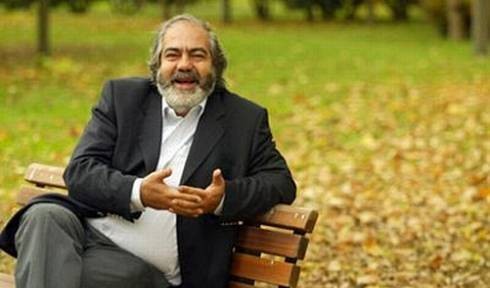
The "Kurdish Initiative" launched by the incumbent government of the Justice and Development Party (AKP) in 2009 has since then deteriorated into a tough "statist" rhetoric accompanied by calls for the re-introduction of the death penalty.
Sadık Yakut, an AKP deputy from the central province of Kayseri, issued a statement through his Twitter account on Aug. 25, suggesting the abolition of the legislative immunity of deputies connected to "terrorism" and the revival of capital punishment.
"Of course, [the death penalty] can be revived if society demands it. Besides, society is focused on this path. I also believe the ban on capital punishment ought to be lifted," he told the daily Hürriyet.
We spoke to Prof. Mehmet Altan, a renowned journalist and a writer, about the AKP's ever toughening rhetoric on the Kurdish issue which occasionally seems reminiscient of the language employed by the National Security Council (MGK,) a far cry from the days it had announced its "Kurdish Initiative."
The AKP never internalized democracy, and once the idea of democratization lost its currency, failures followed one after the other, Prof. Altan said, adding that the government then grew increasingly more authoritarian in consequence.
"They perceive authoritarianism as the sole remedy for mounting failures"
Referring to democracy as a "difficult story," Prof. Altan said it was not easy for someone born in Turkey today to internalize a democratic culture.
"Unless you have an internal democratic guide, and if you think that democracy is no answer and have no such goal as democratizing the regime, then you fail to solve the problems and inadvertantly revert back to the old, bygone methods that you had once been subjected to yourself."
"It is because the AKP's management is so far removed from being a structure that has internalized democracy that its failures begin to mount the moment it drops the issue of democratization from the agenda. As staying in power, rather than democratization, turns into their first and only aim, they believe they can achieve this by force."
"This is a dead end. When you drop the issues of democracy and democratization, failures begin to mount, and you perceive authoritarianism as the sole remedy in turn."
"The AKP attempted to take certain steps during the process of the [Kurdish] Initiative without internalizing democracy. It was impossible to reach a solution without first asking whether the PKK (Kurdistan Workers' Party) represented a cause or an effect."
"The U.S. was to withdraw from Iraq, according to the plan. The U.S. had also desired the mending of ties between Turkey and north Iraq. The PKK was the only problem there. The prevalent perception was that they would pull Syrian militants from up [north] with help from north Iraq and the U.S., and they would thus solve the problem."
"They did not analyze the [situation to realize that] this issue has a sociological basis and that it was always a problem throughout Turkey's entire republican history. This problem could have been resolved, however, if they had asked the fundamental question of whether the PKK constituted the cause or the effect."
"The AKP is a nationalist, conservative, Sunni and Islamist party"
The AKP began losing the initiative along with its accentuation of Islamism instead of democratization, leading to a tightening squeeze with respect to the government's inability to solve the problem, and Parliament Speaker Cemil Çiçek was thus forced to take the initiative himself to resolve the Kurdish issue, according to Prof. Altan.
We asked Prof. Altan about the prospects of a rupture within the AKP in light of the negative reactions elicited by Çiçek's initiative both from certain AKP members and Prime Minister Recep Tayyip Erdoğan, despite the amenable response of the Peace and Democracy Party (BDP.)
"The AKP has turned into a nationalist, conservative, Sunni and Islamist party. The AKP wants keep going for the rest of its tenure by reshaping its coalition, allying with the MHP (Nationalist Movement Party) and the military brass and [acting like its predecessors.]"
"The presence of an interior minister like İdris Naim Şahin is an indication that the AKP is growing increasingly more similar to the MHP, rather than democratizing. I believe this situation is a policy [directly crafted by Prime Minister] Erdoğan."
"The AKP dreams of replacing secularism with religion"
The AKP's only goal is to accrue votes and stay in power, Prof. Altan said.
"[The AKP] had received 58 percent of the votes in the referandum when it had called for change. A new mind-set which aims to come to terms with Ankara, the military and the status quo following the AKP's takeover of the state has come about, however. I do not believe this will help them muster the [proportion of] votes they desire, or meet Turkey's demands. The current shape of things also points in this direction."
"The AKP also dreams of becoming a Mustafa Kemal (Turkey's founder) [with a twist] by replacing secularism with religion instead. None of this will yield any results, however. Over a year has passed since the elections, and this period has also shown that no results will come about."
"As the AKP is a highly pragmatic party, they could also turn very progressive, very democratic, liberal and revolutionary all of a sudden. But this would entirely nullify their persuasiveness over the past decade."
"The issue, however, is not about what the AKP may or may not be; it is making sure that the reforms which Turkey needs come through. It would be no cause for surprise if they attempted a very serious 'initiative' if they see they are going to lose the government." (EKN)








.jpg)


